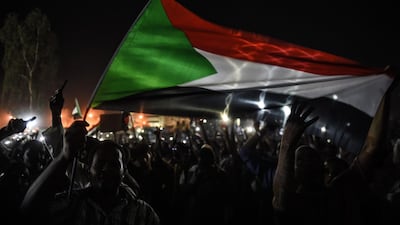Sudan's military chiefs on Thursday postponed talks with protest leaders for three days after renewed clashes in the capital Khartoum and a stalemate on the make-up on the administration that would run the country for a three-year transition period.
Deciding who should be involved in the leadership of the North African country's transition has become one of the major sticking points in negotiations after the removal of President Omar Al Bashir last month.
But after at least eight people were reported wounded by gunshots near a sit-in outside the army complex in the capital, Sudan's army ruler General Abdel Fattah Al Burhan announced negotiations would be suspended for 72 hours.
He is the military figure who has taken control of the country after Bashir was forced out of office. He said talks would still be possible but called on protesters to not provoke security forces, and to unblock the capital's infrastructure, such as roads, railways and bridges.
There were "armed elements among demonstrators who were shooting at security forces", he added.
Earlier on Wednesday, protest leaders confirmed the ruling military council's decision to suspend talks.
"They asked us to dismantle barricades in parts of the capital," Rashid Al Sayid, a spokesman of the umbrella protest movement the Alliance for Freedom and Change said.
Roadblocks on key thoroughfares are being used by demonstrators to pressure the generals to transfer power to a civilian administration.
The protest group that spearheaded the campaign against Bashir said the generals wanted the demonstrators to restrict themselves to the sit-in area where thousands have camped for weeks in central Khartoum, demanding civilian rule.
The protest movement is demanding a civilian-led transition, which the generals have steadfastly resisted since bowing to their demands and toppling longtime autocrat Bashir.
During the first two days of talks the two sides had agreed on an overall civilian structure, including a three-year transitional period for the full transfer of power to a civilian administration.
They had also agreed that parliament be composed of 300 members for the transition, with 67 percent from the alliance and the rest drawn from other political groups.
The composition of the new sovereign council has been the toughest part of the negotiations, with the two sides so far proposing different compositions of the body which is expected to take all key decisions concerning national issues.
The generals want it to be military-led, while the protesters insist on a majority civilian body.

